What Listening Has Taught Me: The Future Is Shaped by What We Remember

Oral historian Nyssa Chow considers the nested memories she belongs to, and invites readers to do the same.
Jump to navigation Skip to content
Articles from Poet & Writers Magazine include material from the print edition plus exclusive online-only material.

Oral historian Nyssa Chow considers the nested memories she belongs to, and invites readers to do the same.
Writers share how they approach the writing life where they live, their personal points of view on the literary community (both small and large) and their place within it, and what resources are available to them as writers who don’t live in a metropolitan area.
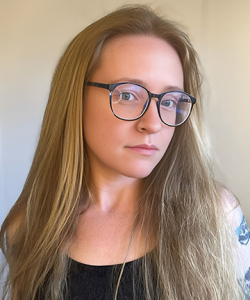
“Nothing makes a clunky sentence more obvious than saying it out loud.” —Margie Sarsfield, author of Beta Vulgaris

Oral historian Nyssa Chow considers how small routines and rituals tell larger stories.
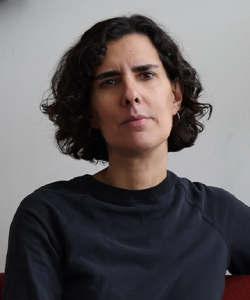
“If a story gathers force by what it accrues, this kind of ending is a letting go.” —Corinna Vallianatos, author of Origin Stories
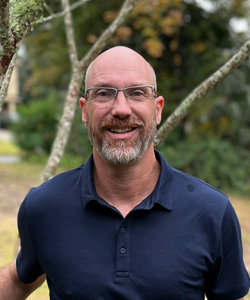
“Don’t worry about aesthetic categories or limitations. Have fun.” —Jonathan Fink, author of Don’t Do It—We Love You, My Heart?

Writer and scholar Rebecca Rainof offers advice on writing about family by considering how “pockets of place can convey a larger sense of home.”

“All you can do is pay attention to the process, the practice, and see what it does to you, what it does to the people around you, what it does to your dear readers.” —Latif Askia Ba, author of The Choreic Period

“Take your time. And indulge in the messiness, the privacy, the anxieties of the writing process.” —Aria Aber, author of Good Girl

Writer and scholar Rebecca Rainof offers advice on how to write about family by considering lessons learned over a lifetime.

“Your e-mails are daily writings. Your grocery lists; your text messages; your poetry magnets on the fridge; your annotations in the margins of your books.” —Kayleb Rae Candrilli, author of Winter of Worship

Writer and scholar Rebecca Rainof offers advice on how to write about family by imagining fictive dialogues.
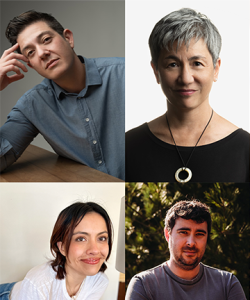
Ten authors answer the question: What’s the best piece of writing advice you’ve ever received?
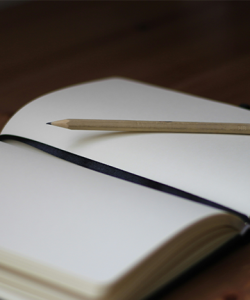
The author of Mothertrucker: Finding Joy on the Loneliest Road in America (Little A, 2021) offers advice on how to make a personal narrative resonate with the wider world.
Writing and revising often seem to hinge on bringing new possibilities into focus. A poet considers the camera obscura as a metaphor for how an inversion of the light can transform and attune us to the moment.
Inspired by the bioluminescence of the anglerfish, the author of Something New Under the Sun encourages writers to furnish their own light and plumb the unknown depths of their text with the hunger of a deep-sea predator.

When “normal” fails, embrace the strangeness and possibility the night can provide. A renowned fiction writer recounts the uncommon delight of inviting others to join her in writing under the moon.
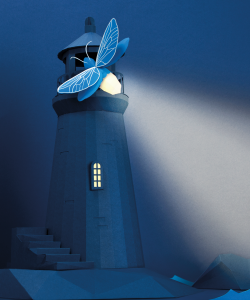
When it seems impossible to find a way into writing, a robust community can be a beam of light in the darkness. The author of Ghost Hour describes the ways that a new writers group helped rekindle and guide her creative practice.

Many things bring light; some bring just enough to keep the monsters at bay. When ideal circumstances are scarce, focus on the dim, constant light that helps you get the work done, even if it comes from an unusual source.

The author of The Dreamcatcher in the Wry spotlights journals and platforms that have published her work and appreciate her wry sense of humor, including the Belladonna and Hunger Mountain.
A novelist shares the way a writer builds intimacy between readers and characters, and how the peculiar glow of the refrigerator light brings warmth to an audience of one.
What does it mean to truly let loose as a writer? The author of I’m Not Hungry but I Could Eat urges us to lean into the fire and pressure head-on, to let everything out on the page and offer it up to the world.

Taking inspiration from a creature of the summer, a seasoned writer suggests a few approaches to stimulate, refresh, and gather your thoughts for the next stage of writing and spark your imagination with play.

Every poetry collection has its “maybes” and “almosts,” the poems that didn’t make it to publication. A debut poet considers the poems that haunt a book from the outside.
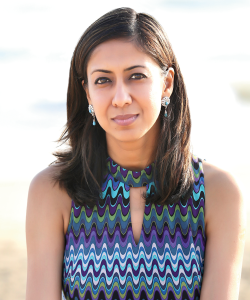
The author of Border Less describes how audience responses to her debut novel’s play with form led her to wonder about the greater implications of the Western fixation on realism as the accepted novel style.